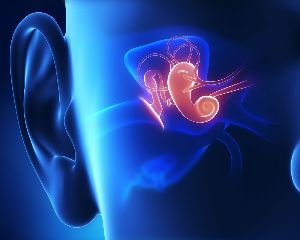|
www.HealthyHearing.com |
Experimental hearing loss drug fails to show benefit in clinical trialFrequency Therapeutics halts research on stem cell drug FX-322
Contributed by Joy Victory, managing editor, Healthy Hearing A clinical trial involving an experimental hearing loss drug has been halted due to disappointing results, pointing to the challenges of treating hearing loss using novel medicines. This also means that if you have untreated hearing loss, hearing aids and other assistive listening devices are still the best treatment for sensorineural hearing loss for the foreseeable future. 
longer be a focus of clinical trials. The drug, dubbed FX-322, is given via injection into the ear drum. Researchers with Massachusetts-based Frequency Therapeutics (now redubbed Korro Bio) were studying if it could successfully and safely convert stem cells into stereocilia, the hair cells in the cochlea that are responsible for hearing. The researchers were conducting several ongoing studies for different types of hearing loss, including age-related hearing loss. Disappointing trial results so far"Data showed no statistically meaningful difference at day 90 between those administered FX-322 versus those receiving placebo in the proportion of individuals that demonstrated an improvement in speech perception," Frequency Therapeutics said in a press release. This isn't surprising news. As reported in 2021 by biotech news site Evaluate, the FX-322 trial results have largely been lackluster. In fact, Bloomberg Law reported in summer 2021 that investors have filed suit against the company for making false claims about the clinical trials. The company is also halting development of a different drug, FX-345, which was in phase 1 safety trials. No cure for hearing loss yetTrials are an important contribution to research on reversing certain types of sensorineural hearing loss, one of the most common forms of hearing loss among the 48 million Americans who report some degree of hearing impairment. Specifically, sensorineural hearing loss is caused by damage to hair cells of the inner ear and/or the auditory nerve that connects the ear to the brain. Damage can be caused by genetic disorders, the aging process and/or from either a one-time or prolonged exposure to excessive noise. Learn more about how we hear and the auditory system. Currently, sensorineural hearing loss is typically treated with hearing aids or cochlear implants, which work with a person's remaining sense of hearing to amplify sounds. Although today’s digital hearing devices are more effective than they were years ago, they do not restore the sense of hearing to its normal state. There is no best medicine for hearing loss related to noise exposure. For sudden hearing loss, steroids are the medicine of choice. Do not delay hearing loss treatmentThe study’s researchers envision these drugs will eventually be injected into the middle ear, much like injections currently used to treat infections—but the treatment is far from being available at your local hearing center. New drug therapies must undergo extensive efficacy and safety testing and approval from the Food and Drug Administration (FDA), which can take many years. That's why we can't stress enough how important it is to get your hearing loss diagnosed and treated now, as wearing hearing aids not only helps your ability to communicate, they also provide health benefits such as improved balance and lower risk of falls. To find a consumer-reviewed hearing specialist near you, browse our directory of thousands of professionals. Joy Victory, managing editor, Healthy Hearing
|
Featured clinics near me
Earzlink Hearing Care - Reynoldsburg
7668 Slate Ridge Blvd
Reynoldsburg, OH 43068

Find a clinic
We have more hearing clinic reviews than any other site!


 Joy Victory has extensive experience editing consumer health information. Her training in particular has focused on how to best communicate evidence-based medical guidelines and clinical trial results to the public. She strives to make health content accurate, accessible and engaging to the public.
Joy Victory has extensive experience editing consumer health information. Her training in particular has focused on how to best communicate evidence-based medical guidelines and clinical trial results to the public. She strives to make health content accurate, accessible and engaging to the public.